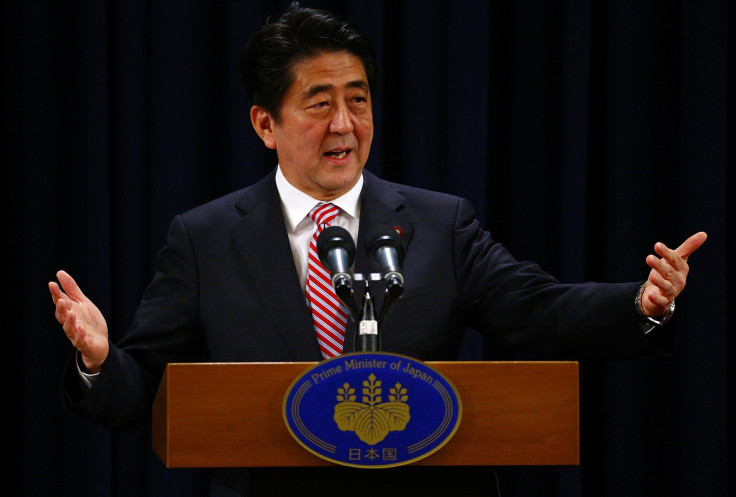Japan's Shinzo Abe To Call For Early Elections: Reports

Japanese Prime Minister Shinzo Abe has reportedly decided to call for an early election, a senior ruling party lawmaker, said, according to Reuters. Abe's ruling party is also considering postponing a further hike in the country's sales tax after it was raised to 8 percent in April.
Abe is expected to hold elections on Dec. 14, less than two years into his four-year term, after announcing a postponement of another sales tax hike, Bloomberg reported. Abe's decision to hike the sales tax -- designed to bring in fresh revenues to the government -- has reportedly triggered Japan's worst economic contraction since the global financial crisis. While a decision to postpone the next sales tax hike is geared to generate some electoral goodwill for the ruling party, an early election could backfire and expose Abe to leadership challenges.
"It looks like Prime Minister Shinzo Abe has finally made up his mind and it's fair to consider that he decided to go to the people," Tadamori Oshima, a former deputy chief of the Liberal Democratic Party, or LDP, said, according to Reuters, which cited Jiji Press agency.
Abe had earlier raised the sales tax to 8 percent from 5 percent in April, and is contemplating increasing it to 10 percent by October 2015. He also plans to push through unpopular legislations including restarting nuclear reactors after the Fukushima disaster of March 2011, and passing laws that would allow Japanese troops to fight abroad for the first time since the Second World War.
“It’s always risky to dissolve the house when you’re the prime minister,” Robert Dujarric, director of the Institute of Contemporary Asian Studies at Temple University in Tokyo, said, according to Bloomberg, adding: “Unless you win a crushing victory, you have nowhere to go but down.”
Abe’s approval rating in the cabinet fell to 44 percent this month while support for his party was at 37 percent, Bloomberg reported, citing a survey done by NHK, a broadcaster. However, the opposition Democratic Party of Japan could reportedly garner only 8 percent of support.
"I don’t think there’s any chance of the LDP losing power entirely, given that the opposition parties are scrambling to find candidates to run against the LDP,” Tobias Harris, an analyst at Teneo Intelligence, said, according to Bloomberg, adding: “An election at this juncture is more about Abe’s strength vis-a-vis his own party than about the opposition.”
© Copyright IBTimes 2024. All rights reserved.












